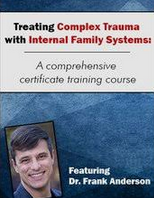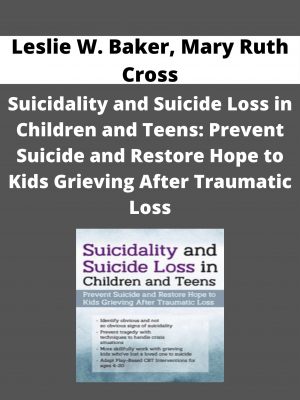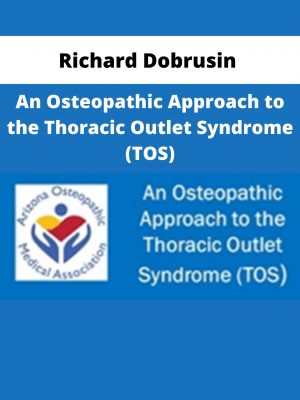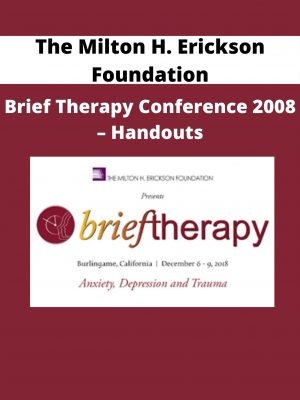Frank Guastella Anderson – Treating Complex Trauma
$299 Original price was: $299.$85Current price is: $85.
Shopping Instructions:
- DISCOUNT 15% : SHOP15
- Product Delivery: Within 1 – 12 hours after purchase.
Available for Pre-Order. This product will be available within a few days.
Frank Guastella Anderson – Treating Complex Trauma
Add additional power to your current clinical approach and make trauma treatment more effective in a shorter period of time when you incorporate Internal Family Systems (IFS) in your practice.
After decades of clinical breakthroughs and scientific research, the IFS model has been shown to be effective for healing even the most complex trauma. Join Dr. Frank Anderson, psychiatrist, author, and vice chair of the Foundation for Self Leadership — the leading organization dedicated to advancing the IFS model through research and training — in this comprehensive certificate course where he provides you a step–by–step guide for applying IFS into your clinical practice.
Throughout the course, special emphasis will be given to understanding how trauma affects the brain and how you can use IFS to heal complex trauma and its common co-morbidities, including anxiety, depression, panic, insomnia, obsessive-compulsive behavior and more.
You’ll also get exclusive insight into how neuroscience can inform why, how and what IFS techniques you should use to maximize your clinical outcomes — so you’ll know exactly how to empower your clients to overcome even the most complex traumas.
You’ll end this online course prepared to start integrating Internal Family Systems with your current clinical models, plus you’ll earn your Certificate in Treating Complex Trauma with Internal Family Systems.
Hailed by the world’s leading trauma authority, Dr. Bessel van der Kolk, as “the treatment method all clinicians should know,” the powerful IFS model can accelerate the healing of complex trauma — providing lasting relief for your clients in a shorter period of time.
You’ve likely heard your clients explain their feelings of conflicting emotions, “a part of me wants to…and then there’s a part of me that doesn’t…” as they grapple with their internal “Self,” desires, and behaviors.
With the transformative IFS approach, the idea of multiplicity of the mind is normal. Every part has a good intention, and every part has value. Even for trauma survivors.
Through engaging case studies, in-session demonstrations, and masterfully presented lectures, Dr. Frank Anderson will show you step-by-step how to apply the most effective, empirically validated IFS interventions to help your clients listen to and understand their conflicting parts to master their emotions — so they can discover deep, lasting healing.
Through nine comprehensive video modules you’ll learn…
How to Treat the Various Types of Trauma
- Acute trauma
- PTSD
- Complex or relational trauma
- Developmental and attachment traumas
- Extreme or dissociative trauma
Internal Family Systems (IFS) Model
- The origins, goals & assumptions
- A non-pathologizing, accelerated approach, rooted in neuroscience
- How IFS differs from phase-oriented treatment
- The importance of our protective responses
- Dealing with emotional overwhelm head-on
- Multiplicity of the mind — we all have parts
- Clinical considerations for clients experiencing abuse
The IFS Technique
- Step 1: Identify the Target Symptom
- Applying meditation practices
- Separating the person (self) from the symptom
- Learning about its intention
- Step 2: Gain Access to Internal Strengths & Resources for Healing
- Moving from defensiveness to curiosity
- The “Self” of the therapist-countertransference redefined
- Accessing compassion to open the pathways toward healing
- Role of empathy in healing — the benefits and the downsides
- Step 3: Find the Fear and Function of the Symptom
- Focusing on its fear
- The real story behind the symptom
- Fostering the internal relationship
- Step 4: Healing of Traumatic Wounds
- Three phases to healing: Witness the pain, remove the wounded part out of the past, and let go of the feelings, thoughts and beliefs
- Science behind the healing — memory reconsolidation
Attachment Disorders and Relational Trauma
- IFS as internal attachment work
- Attachment styles as parts of self
- Attachment trauma- the role of the therapist
- Heal relational wounds of childhood
- Client’s “Self” as the corrective object
- Work with preverbal trauma
Manage Common Co-Morbidities
- Depression, panic attacks, substance abuse, eating disorders, ADD and OCD
- A non-pathological approach
- Comorbidities as protective responses to trauma
- Symptoms as “parts of the self”
Differentiate Therapeutic Issues from Biological Conditions
- Intersection of biology and situation (“Real Mind-Body Medicine”)
- Therapist’s role in biology — When to refer and when to work it through
- Psychotherapy of psychopharmacology
The Neurobiology of Trauma
- Neuroscience for therapists — what you need to know
- Fear circuitry and the development of PTSD
- Extreme reactions and Autonomic Nervous System
- Rage to suicide and dissociation to shame
Dealing with the Extreme Reactions of Trauma
- Talking directly to the symptom
- Introducing the part to the “Self”
- Dealing with the overwhelm — no need for building resources
- How to stay clear and calm while working with clients in extreme states
How Neuroscience Informs Therapeutic Decisions
- Top-down and bottom-up strategies rooted in neuroscience
- When it’s necessary to take over and “be the auxiliary brain” for your client
- When it’s best to slow things down, hand over control and work with the body
- Sensing vs. making sense of things
- At home strategies
Integrate IFS into Your Treatment Approach
- EMDR, DBT, Sensorimotor/SE and other methods
- Transformation vs adaptation or rehabilitation
- Going beyond the cognitive (experiential therapies)
- Integrating IFS with your current clinical approach
This intensive training also includes:
- Live demonstrations
- Meditations
- Practice sessions
It’s easy to get shaken and lose confidence in your approach when a client’s trauma response edges into seemingly uncontrollable dynamics of rage, panic, or suicidal desperation.
In this bonus session, you’ll explore the neurobiological “whats and whys” of hyperarousal, parasympathetic withdrawal, and the underlying symptoms. You’ll also learn how to use neuroscience to inform you treatment model — so you’ll know exactly how to empower your clients with strategies that help produce deep, lasting healing.
This comprehensive manual, complete with downloadable exercises and worksheets, offers straight–forward explanations to help teach clients a new way to identify with their “Self” — separating the person from the symptom to gain control over traumatic experiences. You’ll get:
- Step-by-step techniques
- Annotated case examples
- Unique meditations
- Neuroscience applications
- …and so much more!
Get more insight from Dr. Frank Anderson in an exclusive recorded Q&A call where he’ll address questions from online course attendees and share additional insight into using IFS for treating complex trauma.
Who is this training for?
This certificate training has been specially created for professionals who work with complex trauma, including counselors, social workers, psychologists, marriage and family therapists, case managers, addiction counselors, nurses, and more. The education provided in this intensive online training is designed to breathe new life into your clinical treatment plans for clients who are struggling to overcome the toxic stress of trauma.
This interactive online certificate training also offers you a community of peers and mentors all focused on helping clients succeed.
Continuing Education Credits Available!
and details specific to your profession.
Want to know more about the course outline?
Additional questions about this certificate training?
Please contact PESI toll free at 800-844-8260.
Certificate of Completion
In recognition of completing this intensive training, participants will be awarded a certificate of completion.
Your certificate not only showcases your personal and professional accomplishment, it distinguishes you from your peers and shows your clients, colleagues, and employer your continued dedication in improving therapeutic outcomes.
“A gifted speaker and a national expert on trauma, Frank Anderson introduces a gentle, effective, mindfulness-based model for treating a wide range of clients — from the worried well to the most challenging of borderline clients.” – Janina Fisher, PhD
“Frank Anderson is a brilliant and delightful presenter who has a unique ability to integrate the neuroscience and treatment of trauma with IFS.” – Richard Schwartz, PhD – Developer of Internal Family Systems Therapy
Would you like to receive Frank Guastella Anderson – Treating Complex Trauma ?
About Dr. Frank Anderson:
Frank Guastella Anderson, MD, completed his residency and was a clinical instructor in psychiatry at Harvard Medical School. He is both a psychiatrist and psychotherapist. He specializes in the treatment of trauma and dissociation and is passionate about teaching brain-based psychotherapy and integrating current neuroscience knowledge with the IFS model of therapy.
Dr. Anderson is the vice chair of the Foundation for Self Leadership. He is a trainer at the Center for Self Leadership with Richard Schwartz, Ph.D., and maintains a long affiliation with, and trains for, Bessel van der Kolk’s Trauma Center at Justice Resource Center in Boston, MA.
Dr. Anderson has lectured extensively on the Neurobiology of PTSD and Dissociation and wrote the chapter “Who’s Taking What” Connecting Neuroscience, Psychopharmacology and Internal Family Systems for Trauma in Internal Family Systems Therapy-New Dimensions. He co-authored a chapter on “What IFS Brings to Trauma Treatment in Innovations and Elaborations in Internal Family Systems Therapy” and recently co-authored “Internal Family Systems Skills Training Manual.”
Dr. Anderson maintains a private practice in Concord, MA, and serves as an Advisor to the International Association of Trauma Professionals (IATP).
Speaker Disclosures: Financial: Frank Anderson maintains a private practice. He receives a consulting fee from the Center for Self Leadership. Dr. Anderson receives a speaking honorarium from PESI, Inc. Non-financial: Frank Anderson is the President of the Foundation for Self Leadership.
Access all course videos and materials online forever. Plus, use the CE21 Mobile™ app to access the course content on-the-go, wherever and whenever you want on your mobile devices.
Instantly collaborate with other professionals on the course materials through interactive message boards. You’ll be part of a community of hundreds of practitioners all focused on mastering Internal Family Systems for treating complex trauma, providing valuable opportunities to share insight and experiences and to build your professional network.
Complete your online CE tests and earn up to 14.5 CE Hours!
Related products
HEALTH & MEDICAL
Dr. J.E. Williams & Kevin Gianni – How to Read Your Blood Tests
HEALTH & MEDICAL
HEALTH & MEDICAL
Gaia—Creating-High-Voltage-Health-with-Glenn-Streeter-Open-Minds
HEALTH & MEDICAL












